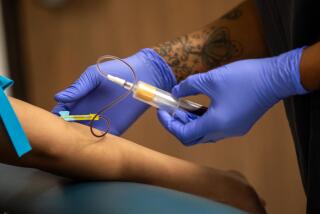House Begins Debate on $1-Billion AIDS Bill : Who Should Be Tested and Who Should Know Results Are Issues in Shaping of National Policy
- Share via
WASHINGTON — Amid sharp disagreement over what government should do to halt the spreading of acquired immune deficiency syndrome, the House on Tuesday began considering legislation that would allocate $1.2 billion to AIDS research, counseling and testing programs.
The sweeping measure, which would establish a national policy on treatment of the fatal disease, has broad bipartisan support, but House members differ over key provisions, especially regarding the confidentiality of testing results.
Some, citing the recommendations of public health experts, believe many persons at risk of developing AIDS will not come forward to be tested unless they are assured that the result will be kept private. Others say the nation needs to know as much as possible about the epidemic and contend that it threatens the entire population.
Senate Version Passed
Although the Senate has passed its own version of a national AIDS policy, the House bill is considered more expansive. Sponsors said that a conference committee will settle on one version in the next few weeks before the legislation is sent to President Reagan.
Under the House bill, being pushed by Rep. Henry A. Waxman (D-Los Angeles), the government would make grants totaling $400 million in each of the next three years for AIDS screening and counseling. Half of that amount would go to state governments and the remainder would go to health organizations that deal with persons at risk of contracting AIDS.
As a condition of the federal aid, state governments would be required to institute AIDS testing of persons arrested for prostitution, sexual assault or intravenous use of illegal drugs. The bill also would require all state offices conducting AIDS tests to report the data to state health departments.
States also would have to establish civil and criminal penalties for knowingly or intentionally passing the AIDS virus to others.
Permanent AIDS Panel
The bill, developed by the health and environment subcommittee of the House Energy and Commerce Committee, which Waxman heads, also would establish a permanent national commission on AIDS and expedite the awarding of AIDS-related research grants.
The legislation would bar disclosure of the results of AIDS tests without the individual’s written consent. The only exceptions permitted would be disclosures to medical workers who may come into contact with AIDS patients, to a mortician preparing a body for burial and to comply with a court order.
The legislation also would permit disclosure of AIDS test results to the sexual or needle-sharing associates of a person who has tested positive for the disease.
Under a procedural rule, however, the House has agreed to consider 12 amendments, many of which would greatly expand the conditions under which the results of AIDS tests could be disclosed.
For example, Rep. William E. Dannemeyer (R-Fullerton) said he will offer an amendment to require hospitals in states where the rate of AIDS infection exceeds 0.1% of the population to test certain patients routinely. Those to be tested would include everyone between ages 15 and 50 undergoing surgery. Hospitals that refused to comply would not be eligible for the federal funds.
Testing Conditions Sought
In addition, Dannemeyer said that he also will propose that states be required to test all jail inmates for the deadly virus, as a condition of receiving federal funds. He has also offered an amendment to require facilities that perform AIDS tests to report the names and addresses of those who test positive to state health departments.
A third amendment, by Rep. Bill McCollum (R-Fla.), would require that states in which the AIDS infection rate exceeds 0.1% of the population screen all marriage license applicants for the virus.
More than 72,600 cases of AIDS have been reported in the United States since the disease was first identified in 1981. Almost 41,000 have resulted in death.
More to Read
Get the L.A. Times Politics newsletter
Deeply reported insights into legislation, politics and policy from Sacramento, Washington and beyond. In your inbox twice per week.
You may occasionally receive promotional content from the Los Angeles Times.










